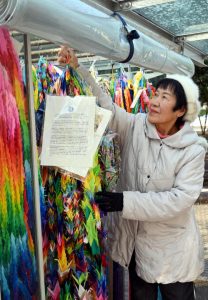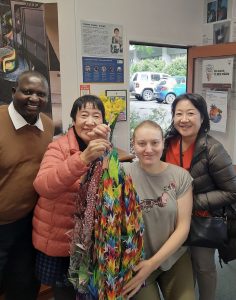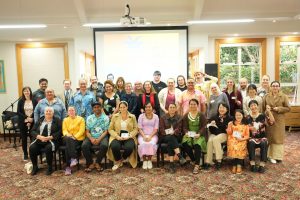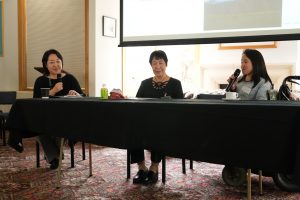Participants of international conference in New Zealand entrust 1,000 paper cranes to Ms. Tanaka, A-bomb survivor, pledging to abolish nuclear weapons
Dec. 20, 2022
Offering one thousand paper cranes to the Children’s Peace Monument
by Kyoko Niiyama, Staff Writer
Toshiko Tanaka, 84, an atomic-bomb survivor living in Hiroshima’s Higashi Ward, attended a conference in New Zealand in November to discuss nuclear issues. On December 19, she offered one thousand paper cranes, folded by students and experts from the South Pacific region, to the Children’s Peace Monument in Peace Memorial Park. The country led the realization of the Treaty on the Prohibition of Nuclear Weapons, which entered into force last year. She took to heart the pledge embodied by the paper cranes that “Together we will call for nuclear abolition.”
Ms. Tanaka was entrusted with more than 1,000 colorful paper cranes in New Zealand and brought them to Japan. She held them up in the paper crane booth and took photos. She said she would send the photos to the participants and report back that she had fulfilled her promise to them. In the future, the Peace Culture Village (PCV, based in the city of Miyoshi), a non-profit organization that cooperates with Ms. Tanaka’s testimony activities, plans to use the paper cranes for peace education.
The conference was held on November 25 and 26 at the national University of Otago in Dunedin in the southeast. The conference, organized by students and one staff member, invited researchers from the Marshall Islands, Fiji, Australia, and other countries and regions that have become nuclear test sites. About 30 people participated with the aim of uniting victims of the use and testing of nuclear weapons and appealing for human rights. The conference was also delivered online.
Ms. Tanaka, who was invited to the conference through an acquaintance, talked about her experience at the age of six, when she was exposed to the atomic bombing 2.3 kilometers from the hypocenter. Participants said that it was the first time they had heard the testimony of an A-bomb survivor in person. They also talked about areas of concern for victims of the use and testing of nuclear weapons that were not noticed in Japan. She said concerns were expressed one after another about the Japanese government’s policy of removing the main radioactive material from contaminated water from the accident at the Tokyo Electric Power Company’s Fukushima No. 1 (Daiichi) nuclear power plant and discharging it into the Pacific Ocean.
Ms. Tanaka said family members of victims of nuclear testing told her they had been inspired because an A-bomb survivor continued to make appeals regarding the inhumanity of nuclear weapons and that she had also been empowered by them. She said, “Nuclear issues must be addressed across borders. I’d like to cherish the connections I made here.”
(Originally published on December 20, 2022)











